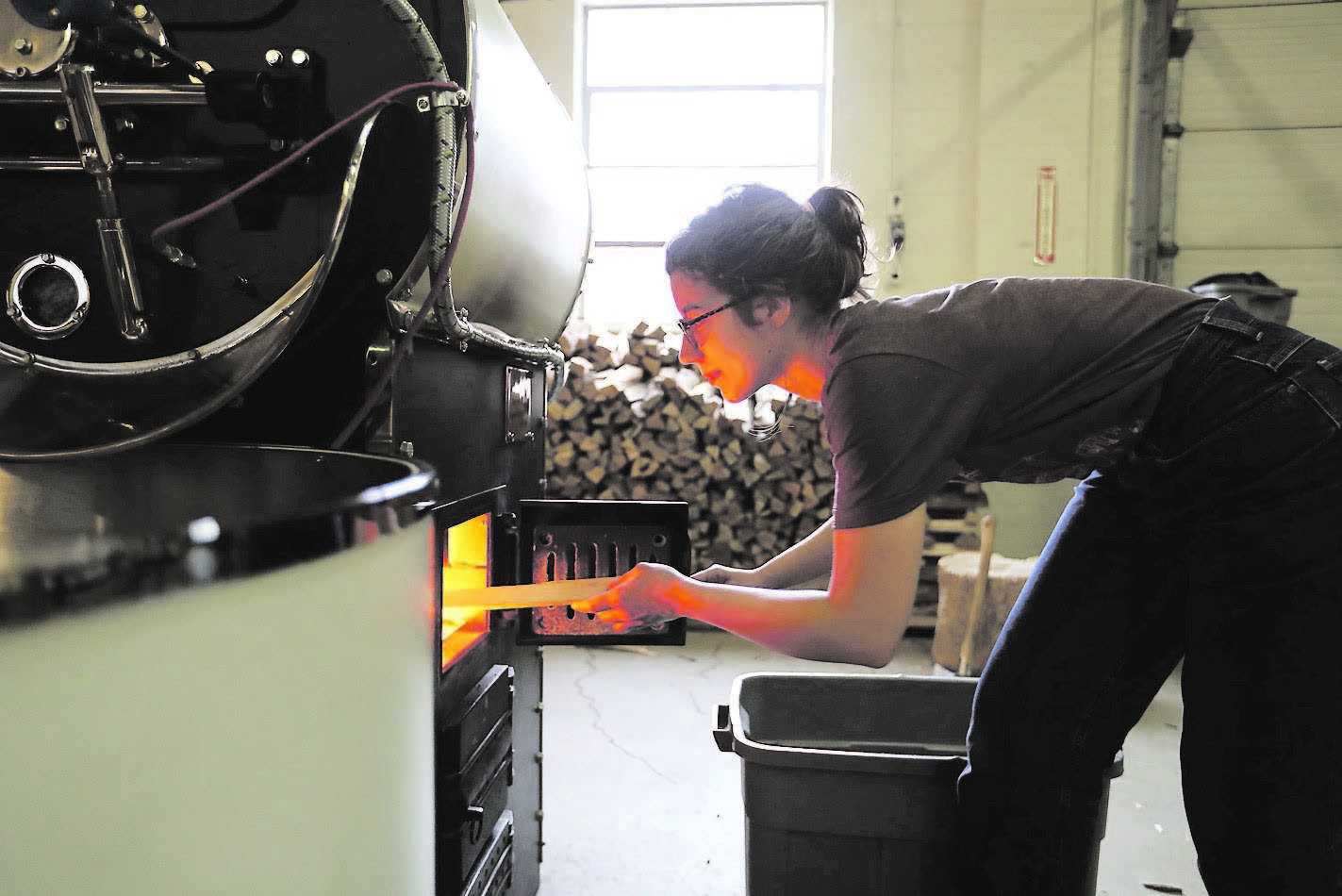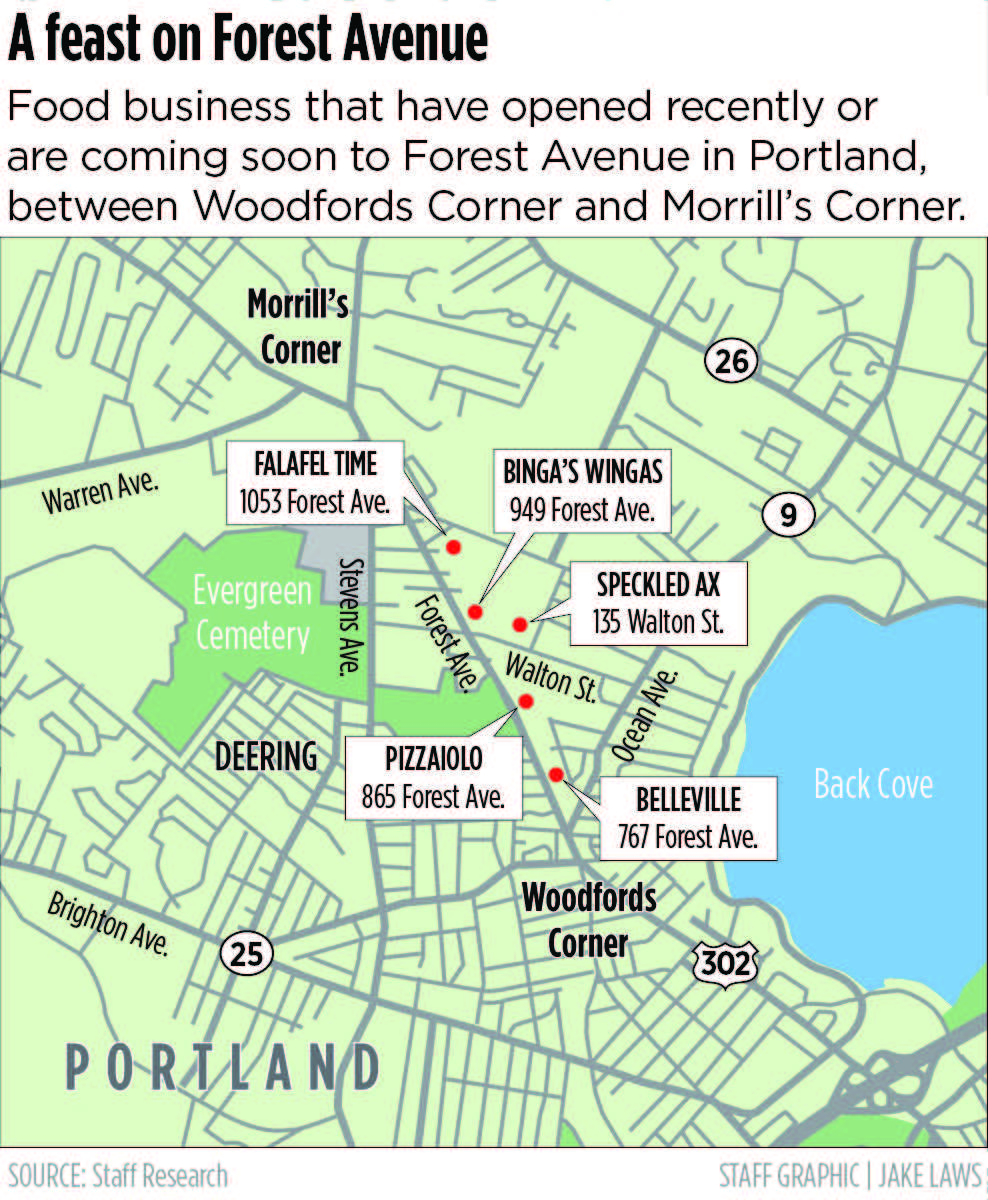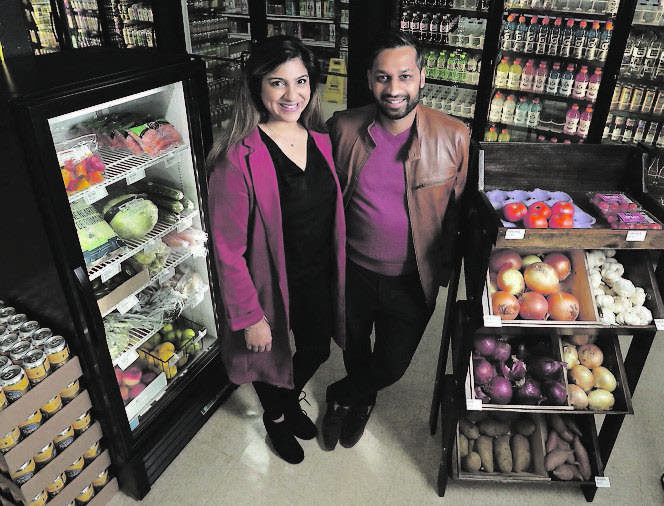
On, or just off, the indistinguishable 1.4-mile stretch of outer Forest Avenue that lies between Woodfords Corner and Morrill’s Corner – amid the hair salons and nail salons; the car washes and dog washes; the Asian, Arab and Afri-can markets; the storefront churches; the tattoo parlors; and the modest eateries – a small cluster of new food businesses have opened, or are set to open, perhaps signaling a shift for a pocket of Portland that is more often seen as a thruway than as a destination.
Just this year, a Speckled Ax coffee production facility, Falafel Time, Coveside Coffee and Pizzaiolo Bar & Grille have opened; Friendly Discount beverage has morphed into Back Bay Superette; Binga’s Wingas has announced plans to move to outer Forest Avenue; and Belleville bakery has secured a location for a production kitchen.
Within the last six years, Rosemont Market opened its production facility on Stevens Avenue, a mere locally farmed Brussels sprout’s throw from Morrill’s Corner; Otto Pizza opened a nearby delivery hub and restaurant on Read Street; Paella Seafood opened (now temporarily closed because of a building fire); and Bird & Co. began to welcome crowds near longtime Woodfords Corner success stories Bayou Kitchen and Big Sky Bread.
Food entrepreneurs, incidentally, aren’t the only businesses people to show interest in the neighborhood; three cannabis shops are in the works for immediately north of Woodford’s Corner alone, and a fourth already has opened.
The new food businesses say they are drawn to the area by less expensive rents (though prices are already edging up, according to realtors and business owners), available production space, plentiful parking, proximity to the Portland peninsula, potential for new customers in underserved neighborhoods; and, in at least a few cases, the thing that drives most other people crazy about outer Forest Avenue – the traffic.
Another factor in the boomlet may be the recent sales of several Stephen Mardigan buildings on Forest Avenue. After Mardigan, who owned several properties there, including his own Avenue Auto Sales, was convicted of illegal gambling in 2019, he had to forfeit many of his real estate holdings.
During a walk down Forest Avenue, headed north from Woodfords Corner, Teresa Valliere, president of the neighborhood association Friends of Woodfords Corner, pointed out several that are showing signs of new activity.
SPACE TO PRODUCE “We’ve been driving by the strip for at least four years,” said Belleville bakery owner Chris Deutsch, who has lived in the neighborhood with his young family for almost that length of time.
“It’s nice to see some movement there, new businesses popping in and new businesses opening up. It’s certainly an up-and-coming area that has some opportunities for sure.”
He said his own decision to locate on outer Forest “has more to do with drastically needing a new production space, more so than the location itself.” When he opened the tiny Belleville on Munjoy Hill four years ago, he was baking 75 to 100 croissants a day. Two years later, customer demand called for 300 to 400 each day, and during the pandemic, numbers swelled to 500 to 600. “We’ve been making hundreds of croissants in 250 square feet,”
Deutsch said. “That’s not a sustainable model nor does it allow us to do any more.
That’s why we sell out. We physically can’t make any more.”
He hopes to reopen the bakery, which has been closed since May but for occasional popups, and to open the Belleville production facility – with a walk-up retail window – in February.
Once settled on Forest Avenue, in the attractive, neatly painted shingled building he has leased, Deutsch expects to produce 1,000 pastries a day.
A 10-minute walk away is the new Speckled Ax coffee production facility, tucked into Walton Street, about a block off Forest Avenue.
Although the focus is production, there is small retail sales counter with togo cups of the distinctive wood-roasted coffee, as well as bagels from Rose Foods, which itself opened on Forest Avenue near the University of Southern Maine in 2017.
Speckled Ax had been roasting coffee for its two Portland coffee shops in South Portland in a facility near the Maine Mall. For several years, owner Matt Bolinder looked for a cheerier space, but faced stiff competition from the cannabis and beer industry. He was relieved to finally lease space on Walton Street, the former home of Izzy’s Cheesecake.
“This was perfect.”
Beyond production, he sees potential to “service a new part of town for folks that wanted our coffee but weren’t necessarily going to be heading into downtown,” as well as to “pilfer” some of nearby Starbucks business, where he frequently observes lines of backedup cars. Maybe, he thinks, we can “service folks who would be more into our coffee.”
And one day, Bolinder would like to open the production facilities “so the public can see where the coffee comes from.”
While his rent is actually higher than he paid in South Portland, “the space is much more pleasant,” he said.
STOPPING TRAFFIC
Avoiding the “headache of downtown” and capitalizing on passing outbound traffic was very much on Pat Scally’s mind when he opened the sizable Pizzaiolo Bar & Grille in July in the old (1990s) Raoul’s Roadside Attraction dance bar, and later a rotation of other restaurants, which had been standing empty for some five years. Also, he loves the distinctive big red building. “It’s my favorite building in Portland. I like the looks of it. And all the history of it. And the fact it has a parking lot,” Scally said.
Scally has operated Pizzaiolo on Cumberland Avenue since 2016, selling New Yorkstyle pizza by the slice, a practice he has continued on Forest Avenue from a glass display case immediately to the right of the door. “Your white pies here, red pies here, specialty pies down here,” he says, pointing proudly. “In the Bronx, even they don’t have as many (varieties) as I do. Twenty-four different kinds.” He’s expanded the menu at the bar and grill, offering chicken wings, shrimp scampi, meatball parmesan and more, and the place has live music, too.
Forest Avenue narrows to one sometimes agonizing lane for about a mile in front of Pizzaiolo. Some 19,000 to 25,000 cars a day drive by, according to state Department of Transportation studies. Woodfords Corner is the second-busiest intersection in the state. Morrill’s Corner is the busiest.
(The city’s Department of Public Works and planning office as well as the state Department of Transportation are working on redesigning Morrill’s Corner, based on the 2018 Portland-South Portland Smart Corridor Plan, which devoted almost 10 pages to the Woodfords Corner/Morrill’s Corner stretch.) Commuters may seethe, but Scally spied an opportunity.
“They are sitting in traffic anyway so I’ve got their attention,” he said. Instead of waiting, vexed and frustrated, he thinks they’ll pull in for a fast slice, or even a whole pizza (“on their way home to Windham that it’d still be hot when they get home”), or maybe a deal on drinks and appetizers, which are priced enticingly low on weekdays from 3 to 5 p.m. “By the time you are done, the traffic is gone,” Scally figures.
‘FOR THE COMMUNITY’
Qutaiba Hassoon, owner of Falafel Time, which opened in an old Papa John’s earlier this month, selling its namesake falafel as well as kebabs, pizza, baba ghanoush and more, is likewise well aware of the traffic. “Between 3 and 7 p.m., the cars are bumper to bumper,” he said. Consequently, his dad, who used to own Haggarty’s, a British-Indian-Middle Eastern eatery just a half mile away on Forest Avenue, suggested his son focus on dinner.
But Hassoon noticed something else that’s far harder to see on the characterless commercial stretch – the neighborhood. “I said, there are a lot of offices and a lot of (University of New England) students. Even lunchtime, it’s busy.”
Sam Patel and his wife, Radhika Shah, reached a similar conclusion, mostly by accident. For 10 years, Patel has co-owned Friendly Discount Beverage with his uncle and another partner (he has since bought them out). For just as long, they have been trying – and failing – to get a spirits license from the state, which would allow them to compete with the nearby, well-established RSVP Discount Beverage.
Last June, after Hilltop Superette on Munjoy Hill got such a license, Patel and his wife bought the store. But a funny thing happened on the way to their beverage business dreams. It turned out they enjoyed running a market.
“Over last 17 and 18 weeks, it blew my mind how fun it is and how much it serves its purpose on the hill,” Patel said. “It’s a one-stop shop, for produce, food. You can order stuff from the kitchen.
We take EBT. You can get all your vices under one roof – your Pringles, even your cat and dog food. It serves this huge purpose.”
That got him rethinking Friendly Discount Beverage: “Why are we competing with our competitors on Forest Avenue over booze? It doesn’t make any sense,”
Patel said. “Let’s pivot and let’s do something for that neighborhood, for the community, something that is a bit more convenient than going to Hannaford and Shaw’s. On that part of Forest Avenue, there isn’t anything that screams, ‘I can run across the street and get my eggs and milk and cheese.’ “ Earlier this month, they rebranded themselves Back Bay Superette, and added items like Cabot cheese, local farm eggs, lemons, salad dressing and Shake ‘n Bake. “We still have huge selection of wine, a huge selection of beer. We neverremoved anything,” Patel said. “We added groceries and produce and to-go food, and soon coffee. The essential stuff.”
He hopes to capture both the “hundreds of workers in the micro-area” and the commuters.
THINKING AHEAD
For now, running across outer Forest Avenue seems unimaginable, or certainly unsafe. But Nell Donaldson, director of special projects in the Portland planning department and Valliere, of Friends of Woodfords Corner, can imagine it, and they are working toward that vision. For one, Valliere pictures a street crossing where Baxter Woods abuts Forest Avenue. She imagines bump-outs, a raised road surface, and pedestrians and students regularly, and safely, crossing from Baxter Woods and the Deering Center neighborhood to get something to eat on Forest Avenue. She imagines better landscaping, improved sidewalk snow removal and businesses with attractive street-facing facades north of Woodfords Corner, all things that could encourage pedestrians – and community.
That kind of idea is part of a national urban planning movement focused on “the 5-minute or 10-minute neighborhood. The walkshed,” Donaldson said.
“We hear from people all the time – people want to be able to walk to a coffee shop, people want to be able to walk to buy milk. We want everybody to be in walking/ biking distance of the critical things they need.”
Another issue in the city’s sights is affordable housing.
“Those are honestly two things that stretch of Forest Avenue could use some work on,” she said.
She added a caution. “A lot of this movement to find new places is great,” Donaldson said.
But it’s worth remembering the well-established food businesses on outer Forest Avenue, including many owned by immigrants, that are also attracted to the area by the affordable rents.
“We want to make sure we are not displacing, that we are still leaving spaces for people who cannot afford rents as they go up,” Donaldson cautioned. “That is the double-edged sword.
That is something we are thinking about.”
Peggy Grodinsky — 207-791- 6453 pgrodinsky@pressherald. com Twitter: @pgrodinsky

